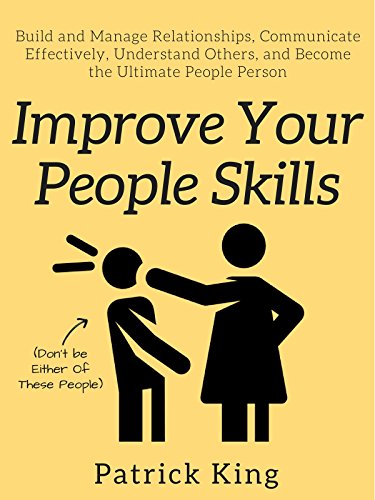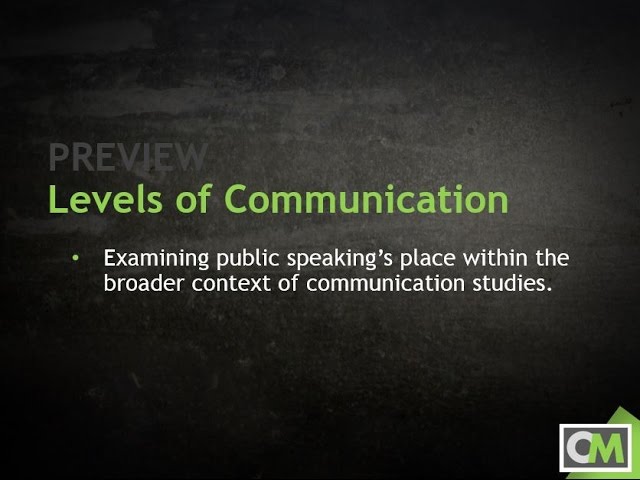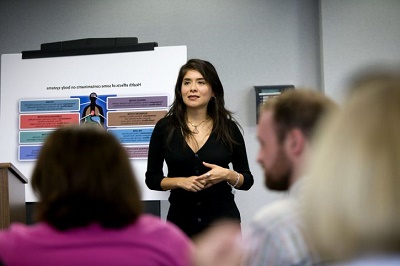How To Improve People Skills?
To improve people skills, practice active listening and empathy to better understand and connect with others. Improving your people skills is crucial for building strong relationships, whether in personal or professional settings.
Active listening and empathy are two essential skills that can help you forge deeper connections and enhance your communication abilities. Active listening involves fully engaging with the speaker, maintaining eye contact, and responding thoughtfully. This demonstrates your interest and shows that you value their perspective.
Additionally, empathy enables you to understand and share the feelings of others, fostering a sense of trust and rapport. By honing these skills, you can improve your relationships, resolve conflicts more effectively, and become a more adept communicator overall. We will explore practical strategies to enhance your people skills and promote better connections with those around you.
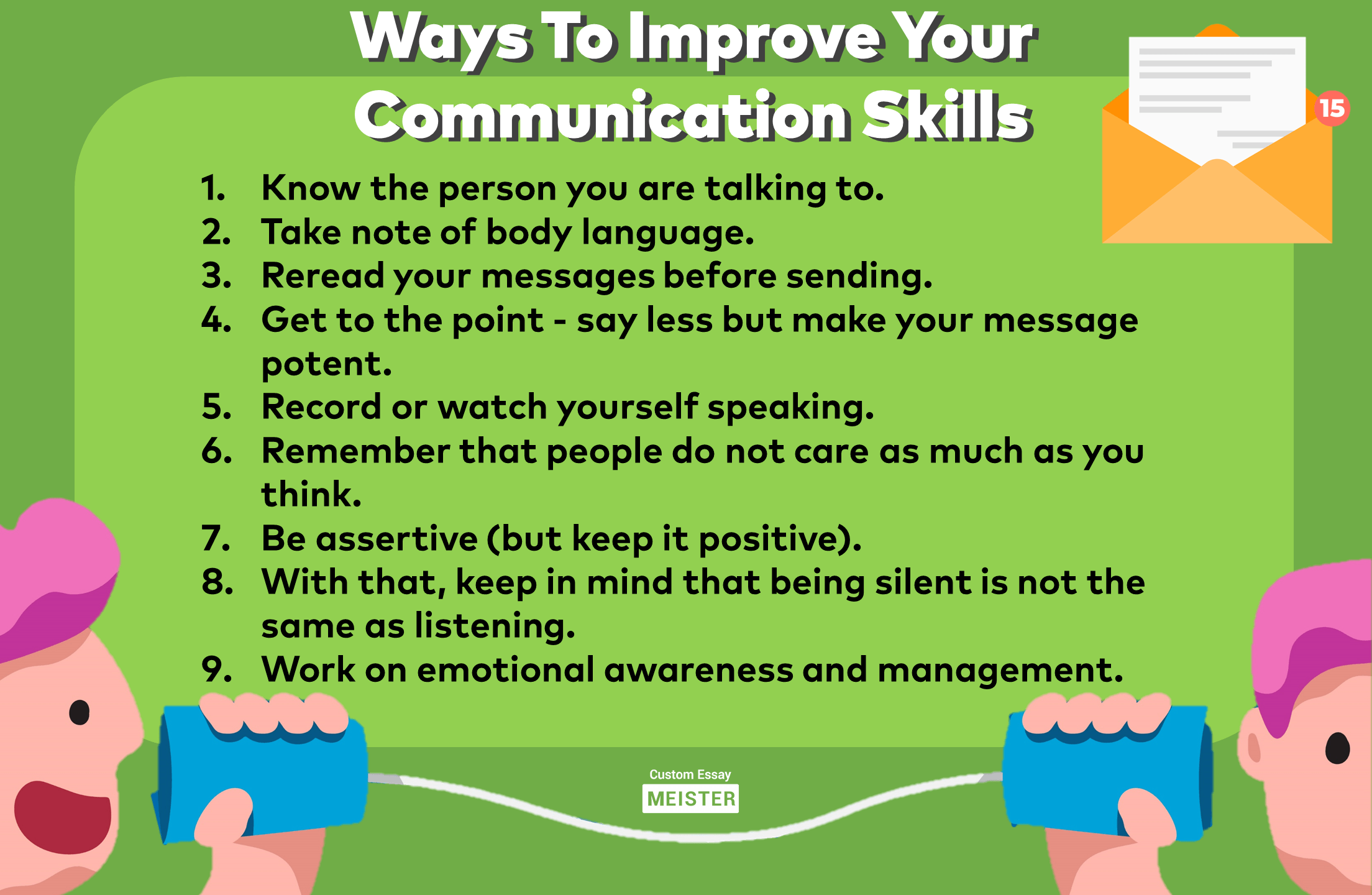
Credit: www.customessaymeister.com
Developing Active Listening Skills
Improve your people skills by developing active listening skills. Enhancing your ability to actively listen can lead to better understanding, effective communication, and stronger relationships.
Active listening is a crucial skill in enhancing our overall people skills. It involves not just hearing the words being spoken, but also truly understanding and empathizing with the speaker. By actively engaging in the conversation and showing genuine interest, we can build stronger connections, improve our communication, and foster positive relationships.Practice Empathic Listening
One of the key elements of active listening is practicing empathic listening. Empathy is the ability to put yourself in someone else’s shoes and understand their perspective. When engaging in empathic listening, it’s important to focus on the speaker and show genuine interest in what they are saying. Avoid interrupting or jumping to conclusions, as this can hinder effective communication. Instead, give the speaker your full attention, providing verbal and non-verbal cues that demonstrate your empathy and understanding.Maintain Eye Contact
Maintaining eye contact is another crucial aspect of active listening. It not only shows respect and engagement but also helps to establish a deeper connection with the speaker. By maintaining eye contact, you convey sincerity and show that you are actively listening. This simple gesture can make a significant difference in the quality of your interactions and build trust and rapport. To maintain eye contact effectively, focus on looking directly into the speaker’s eyes, without being overly intense or making them uncomfortable. Remember to blink naturally and occasionally shift your gaze to avoid staring. By doing so, you create a comfortable and supportive environment that encourages open communication and collaboration.Summary:
Developing active listening skills is essential in improving your overall people skills. By practicing empathic listening and maintaining eye contact, you can enhance your ability to understand and connect with others. These skills are not only beneficial in personal relationships but also in professional settings, enabling you to collaborate effectively and build successful partnerships. Start incorporating active listening into your interactions today and experience the positive impact it brings.Enhancing Verbal Communication
Enhance your people skills by focusing on improving verbal communication. Learn effective techniques to express yourself, engage others, and build strong relationships.
Enhancing verbal communication is essential for improving people skills. One major aspect of verbal communication is public speaking skills. When you can confidently speak in public, it leaves a lasting impression and helps you effectively convey your message. Here are some strategies to improve your public speaking skills:
Improve Public Speaking Skills
1. Practice regularly: Practice makes perfect. Regularly practice speaking in front of a mirror or with a supportive friend or family member. This helps build confidence and reduce anxiety when speaking in public.
2. Know your audience: Before delivering a speech or presentation, research your audience and understand their needs and interests. This allows you to tailor your message and engage them more effectively.
3. Use visual aids: Incorporate visual aids such as slides, charts, or props to enhance your speech. Visuals can help illustrate your points and keep your audience engaged.
Use Open and Direct Language
Another essential aspect of enhancing verbal communication is using open and direct language. Clear and concise communication helps avoid misunderstandings and builds better relationships. Here are some tips to improve your language skills:
1. Be aware of your body language: Your body language can convey messages just as much as your words. Maintain eye contact, use appropriate gestures, and have an open posture to appear approachable and engaged.
2. Listen actively: Pay attention to the person speaking and show genuine interest in what they are saying. Respond appropriately and ask clarifying questions to ensure understanding.
3. Use simple and precise language: Avoid using jargon or complex words that your audience may not understand. Instead, focus on being concise and using language that is easily comprehensible.
Cultivating Nonverbal Communication
Improving your people skills is key to building successful relationships and thriving in both personal and professional settings. One essential aspect of effective communication is nonverbal communication. Cultivating nonverbal communication involves mastering body language and understanding facial expressions. By paying attention to these subtle cues and making small adjustments, you can significantly enhance your ability to connect with others.
Mastering Body Language
Body language is a powerful form of nonverbal communication that can greatly impact how others perceive and interpret your message. By mastering your body language, you can convey confidence, approachability, and sincerity.
- Maintain an open posture by keeping your shoulders relaxed and your arms uncrossed.
- Make eye contact to show attentiveness and interest in the conversation.
- Use hand gestures sparingly and purposefully to emphasize points or convey enthusiasm.
- Lean slightly towards the person you are speaking with to demonstrate engagement.
- Pay attention to your facial expressions to ensure they align with the tone of the conversation.
Understanding Facial Expressions
Facial expressions play a crucial role in conveying emotions and intentions, often revealing more than words can express. Developing your understanding of facial expressions allows you to accurately interpret others’ feelings and adjust your own nonverbal cues accordingly.
Here are some common facial expressions and their associated meanings:
| Expression | Meaning |
|---|---|
| Smiling | Friendliness, warmth, and approachability |
| Furrowed eyebrows | Confusion or deep concentration |
| Wide eyes | Surprise or shock |
| Narrowed eyes | Skepticism or suspicion |
| Raised eyebrows | Interest or curiosity |
By becoming more aware of your own facial expressions and learning to recognize and respond to others’, you can enhance your ability to communicate effectively through nonverbal cues.
Building Emotional Intelligence
Emotional intelligence is a crucial skill that empowers individuals to navigate the complex world of human interactions with empathy, understanding, and resilience. It involves being aware of one’s own emotions and those of others, and using that awareness to build positive relationships. Building emotional intelligence can greatly improve your people skills, enabling you to communicate effectively, resolve conflicts, and foster a harmonious environment. In this article, we will explore two key aspects of building emotional intelligence: increasing self-awareness and practicing empathy.
Increase Self-awareness
Self-awareness is the foundation of emotional intelligence. It involves recognizing and understanding your own emotions, strengths, weaknesses, and triggers. By increasing your self-awareness, you can gain a better understanding of how your emotions impact your behavior and the impact it has on others. Here are a few strategies to help you increase your self-awareness:
- Regular self-reflection: Set aside time to reflect on your emotions, actions, and their consequences. Consider how your emotions influence your interactions with others.
- Seek feedback: Ask trusted friends, family members, or colleagues for honest feedback on how they perceive your emotions and behavior in various situations.
- Journaling: Write down your thoughts and emotions regularly. This helps you identify patterns and triggers, giving you valuable insights into your emotional responses.
Practice Empathy
Empathy is the ability to understand and share the feelings of others. It involves putting yourself in someone else’s shoes and seeing things from their perspective. Practicing empathy fosters connection, strengthens relationships, and promotes effective communication. Here are a few ways to practice empathy:
- Active listening: Pay full attention to the person speaking, without interrupting or thinking about your response. Seek to truly understand their emotions and concerns.
- Show genuine interest: Ask open-ended questions and engage in meaningful conversations to show that you value the other person’s thoughts and feelings.
- Validate emotions: Acknowledge and validate the emotions of others, even if you don’t fully understand or agree with them. Let them know that their feelings are valid and respected.
By actively cultivating self-awareness and practicing empathy, you can strengthen your emotional intelligence and improve your people skills. These skills not only enhance your ability to connect with others on a deeper level but also contribute to your personal growth and success in various aspects of life.
Developing Conflict Resolution Skills
Conflict is an inevitable part of life, occurring in various settings such as work, relationships, and even within ourselves. Learning how to effectively resolve conflicts is an essential skill that can improve our relationships, boost productivity, and promote personal growth. Developing conflict resolution skills involves improving negotiation techniques and promoting effective compromise. In this article, we will explore these two strategies in detail and provide actionable tips for enhancing your conflict resolution abilities.
Improve Negotiation Techniques
Negotiation is a valuable skill that allows individuals to find common ground and reach mutually beneficial agreements. Whether it’s negotiating a raise at work or resolving a disagreement with a loved one, honing your negotiation techniques can lead to better outcomes and less animosity. Here are some practical tips to improve your negotiation skills:
- Listen actively: Pay close attention to the other person’s viewpoint and show genuine interest in understanding their perspective.
- Express yourself clearly: Clearly articulate your own needs, concerns, and desired outcomes using simple and concise language.
- Identify common goals: Find common ground by highlighting shared interests or objectives that can help form the basis of a mutually satisfactory resolution.
- Be flexible and open-minded: Instead of fixating on a single solution, explore different alternatives and be willing to adjust your expectations.
- Collaborate, don’t compete: Approach the negotiation process with a cooperative mindset, valuing the importance of finding win-win solutions.
Promote Effective Compromise
Compromise allows conflicting parties to find middle ground and create solutions that satisfy everyone involved. It requires an open and empathetic mindset, as well as effective communication strategies. Here are some key principles for promoting effective compromise:
- Recognize the needs of all parties: Consider the underlying motivations, emotions, and priorities of each person involved in the conflict.
- Acknowledge emotions: Validate and acknowledge the emotions expressed by others, fostering a sense of understanding and empathy.
- Find creative solutions: Encourage brainstorming and creative thinking to explore innovative solutions that address the needs of each party.
- Focus on interests, not positions: Look beyond initial demands and delve into the underlying interests and concerns of all parties involved.
- Create win-win outcomes: Strive for solutions that satisfy the interests of both parties, maximizing overall satisfaction and cooperation.
By developing your conflict resolution skills, you can navigate through challenging situations with grace and diplomacy. Continuous practice and a commitment to effective communication will help you become a master at negotiating and promoting compromise. Through these strategies, conflicts can be transformed into opportunities for growth and positive change.
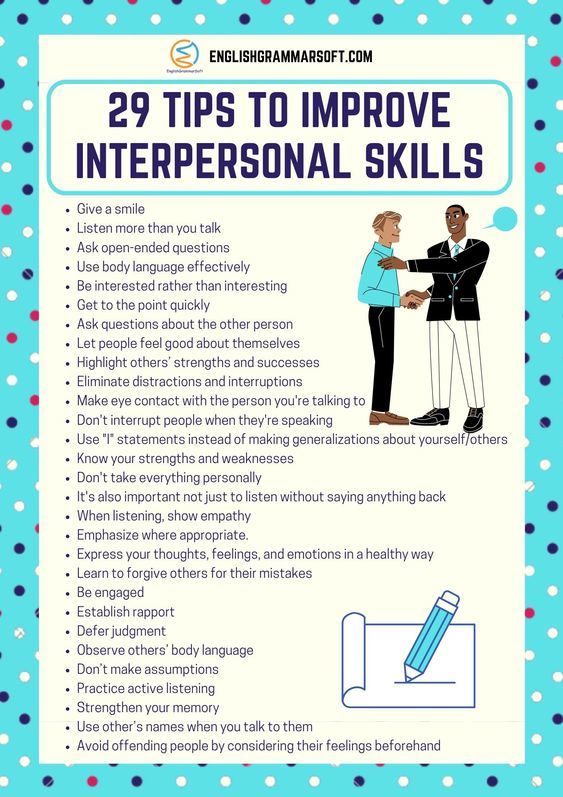
Credit: elearninginfographics.com

Credit: www.pinterest.com
Frequently Asked Questions On How To Improve People Skills?
How Can I Improve My People Skills?
Improving your people skills can be done through active listening, practicing empathy, and developing effective communication techniques.
What Are The Benefits Of Improving People Skills?
By improving your people skills, you can enhance your relationships, build trust, resolve conflicts, and increase collaboration and teamwork.
Can Introverts Improve Their People Skills?
Yes, introverts can improve their people skills by taking small steps, practicing social interactions, and focusing on their strengths, such as active listening and thoughtful communication.
Conclusion
Developing strong people skills is crucial for personal and professional growth. By actively listening, practicing empathy, and fostering open communication, you can enhance your relationships and create a positive impact on those around you. Remember, improving people skills is an ongoing process that requires continuous self-awareness and practice.
Investing time and effort into developing these skills will not only enhance your personal life but also benefit your career by improving teamwork, leadership abilities, and overall communication effectiveness. Start implementing these strategies today and witness the positive transformations in your interactions with others.
